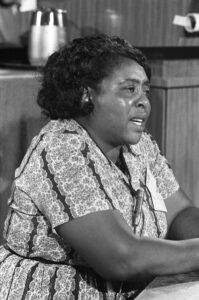Black History: Honoring Fannie Lou Hamer’s Legacy
Black history isn’t just about remembering—it’s about learning, honoring, and continuing the work of those who paved the way. One such trailblazer was Fannie Lou Hamer, a sharecropper-turned-activist who refused to accept poverty and hunger as inevitable.
The Birth of Freedom Farms
In the midst of the Civil Rights Movement, many Black communities remained trapped in cycles of poverty, particularly in the rural South. Political and social rights were being fought for, but economic empowerment was often overlooked. Hamer recognized this gap and took action.
In 1967, Hamer founded the Freedom Farms Cooperative (FFC) to provide Black farmers and underprivileged communities with more than survival—they deserved freedom, empowerment, and self-sufficiency. The goal was clear: to offer economic support, resources, and opportunity while fostering solidarity across racial and socioeconomic divides.
Who Was Fannie Lou Hamer?
Born in 1917 in Mississippi, Hamer was the youngest of 20 children in a sharecropping family. She began working in the cotton fields at age six, experiencing firsthand the economic oppression of Black sharecroppers; however, Hamer was a fighter.
In the 1960s, she emerged as a civil rights leader, advocating for Black voting rights despite arrests, beatings, and death threats. In 1964, she testified before Congress about racial violence, famously declaring, “I’m sick and tired of being sick and tired.”
Yet she knew voting rights weren’t enough. Black people needed land, food, and economic power—so she founded Freedom Farms.
Freedom Farms: Planting Seeds of Liberation
For generations, Black families worked on white-owned land, often barely having enough food to eat. Hamer believed economic independence was essential to true freedom.
Hamer and her team acquired hundreds of acres of land, enabling Black families to farm, build homes, and sustain themselves without fear of eviction. But Freedom Farms was more than just a farm—it was a movement for self-sufficient
- A pig bank provided livestock to families in need.
- A food program ensured no one went hungry, regardless of income.
- Housing initiatives offered shelter to displaced families.
- Vocational training equipped people with skills for economic stability. More Than a Farm—A Legacy
Hamer wasn’t just feeding people; she was empowering them. She believed, “Nobody’s free until everybody’s free.”
Though Freedom Farms eventually faced financial struggles and closed, its impact lives on. Today’s spirit continues in:
- Black-owned urban farms
- Food justice movements
- Advocacy for Black land ownership
Continuing the Legacy
Fannie Lou Hamer’s vision didn’t end with Freedom Farms—it lives on in every effort to promote economic empowerment and food justice.
How can we honor her legacy?
- Support Black-owned farms and businesses.
- Advocate for food security in our communities.
- Educate ourselves on land ownership and economic justice.
Black history is not just a story of struggle—it’s a story of resilience, self-determination, and power. The seeds have been planted. Now, it’s up to us to keep them growing. How will you help keep this legacy alive?

